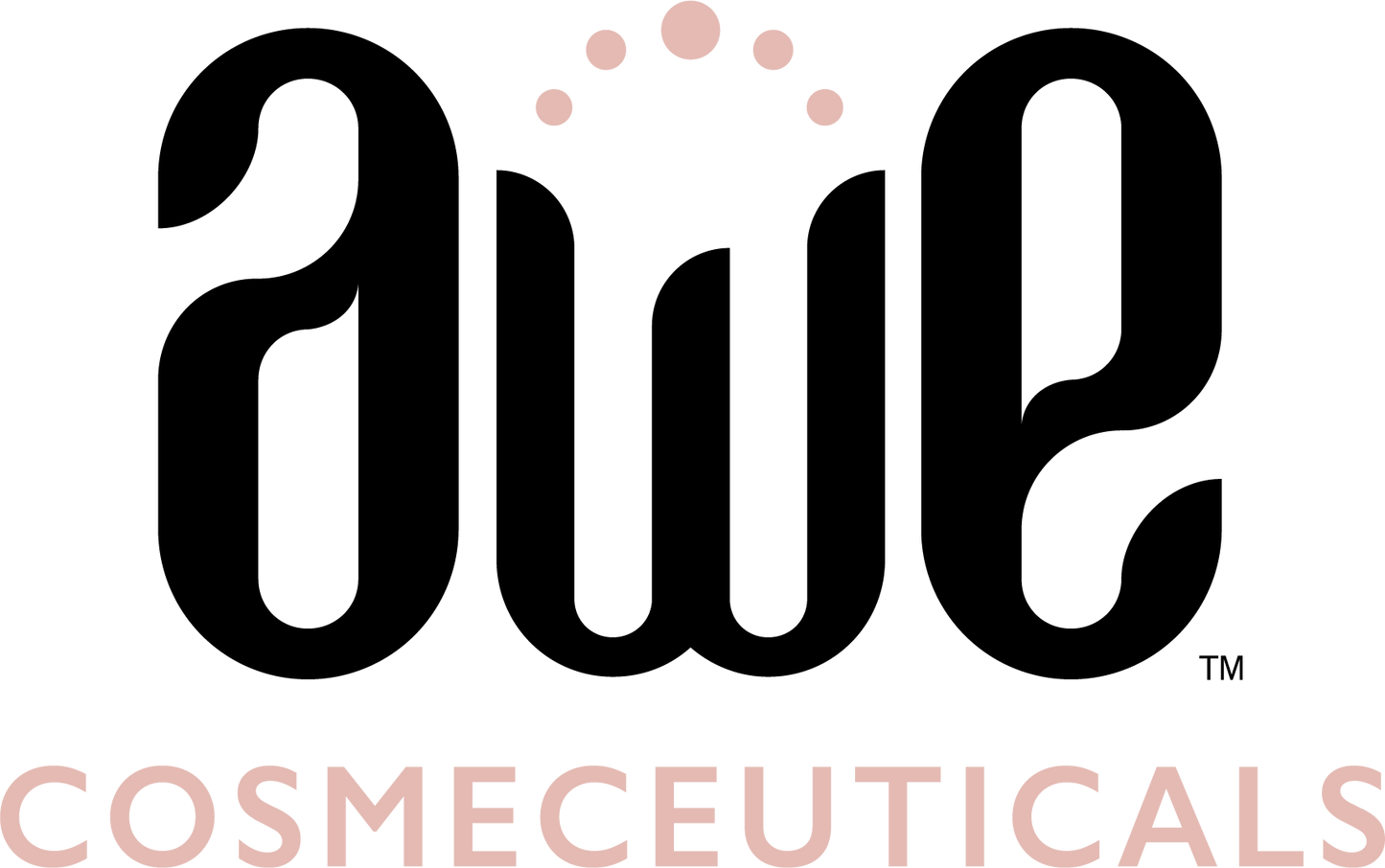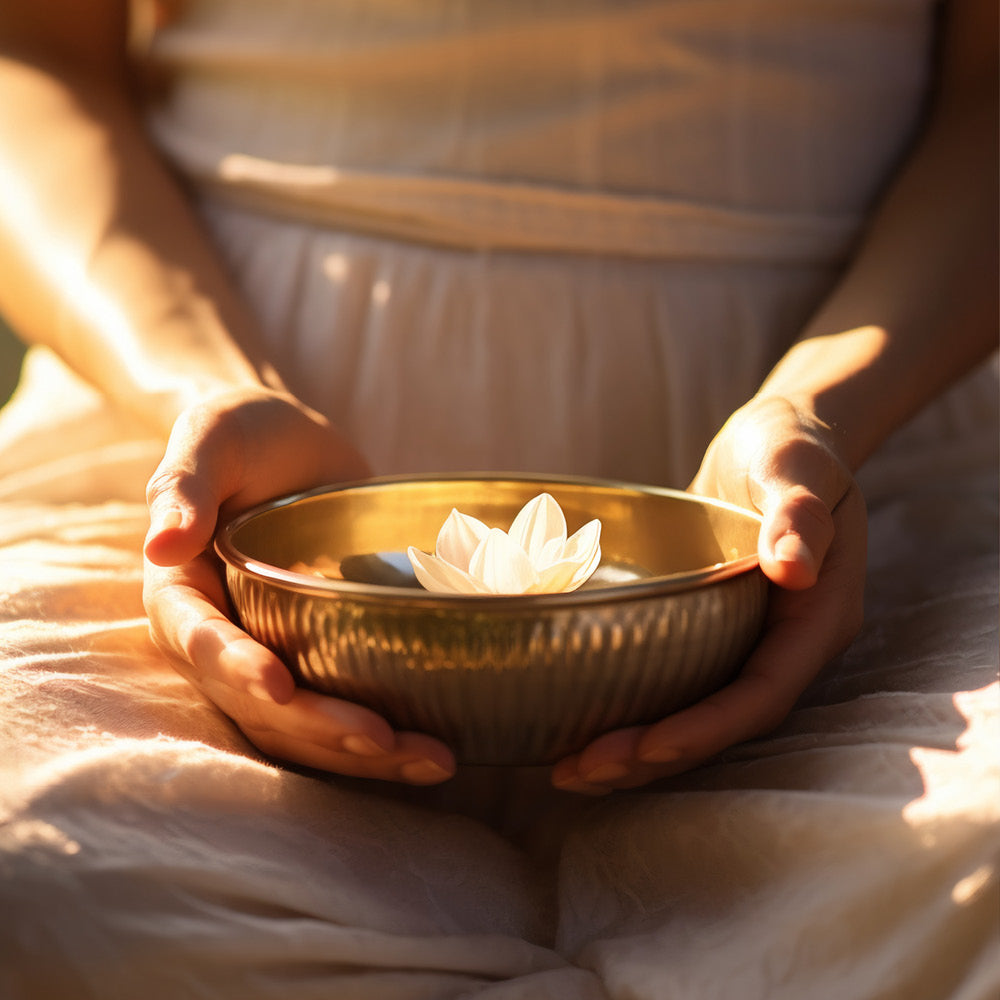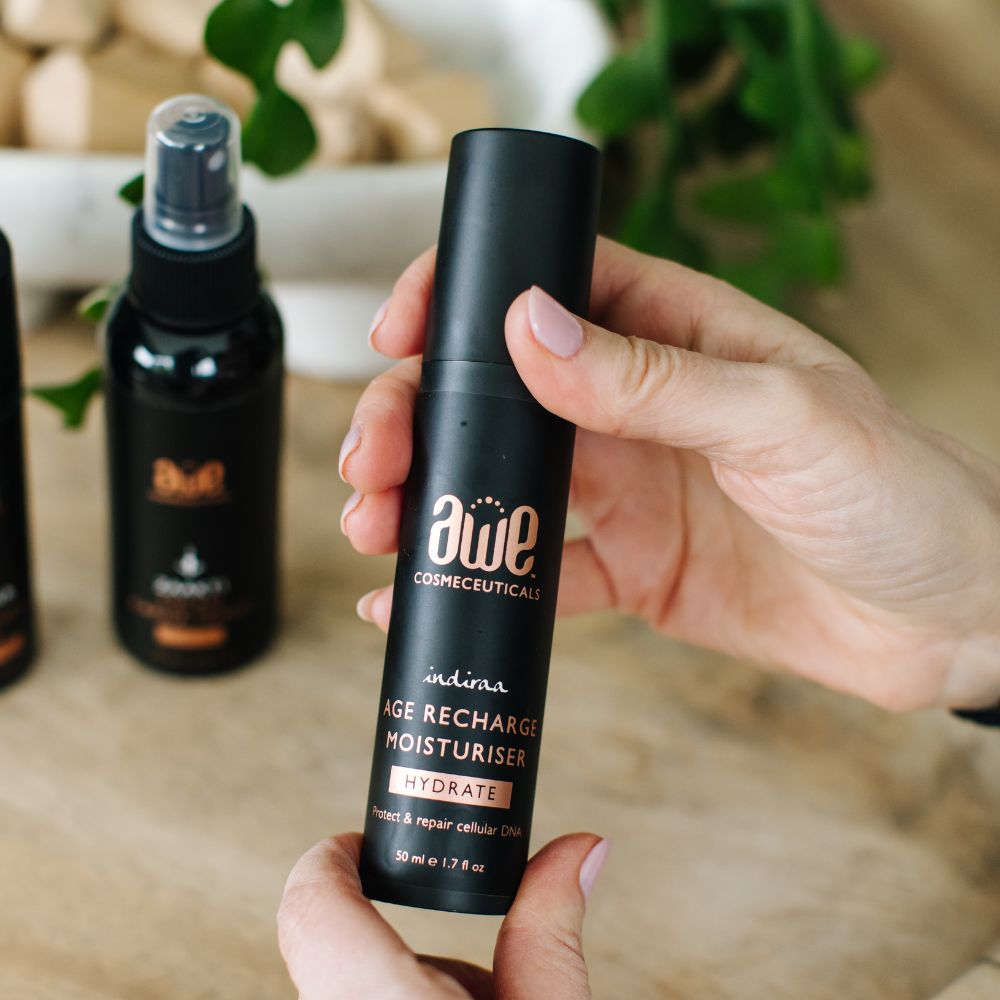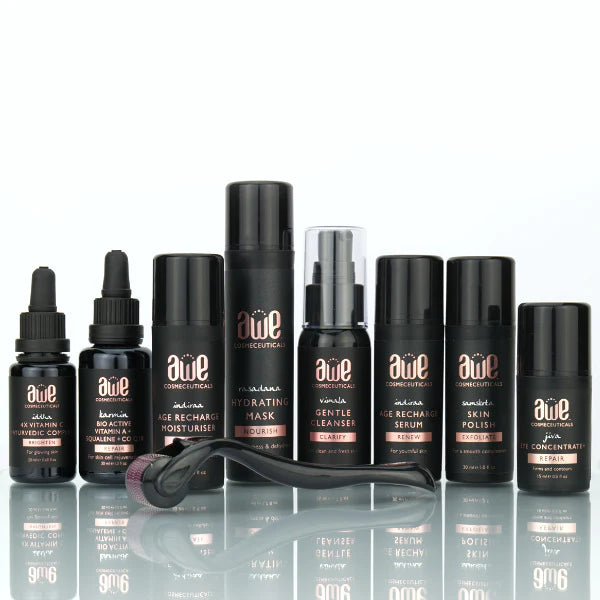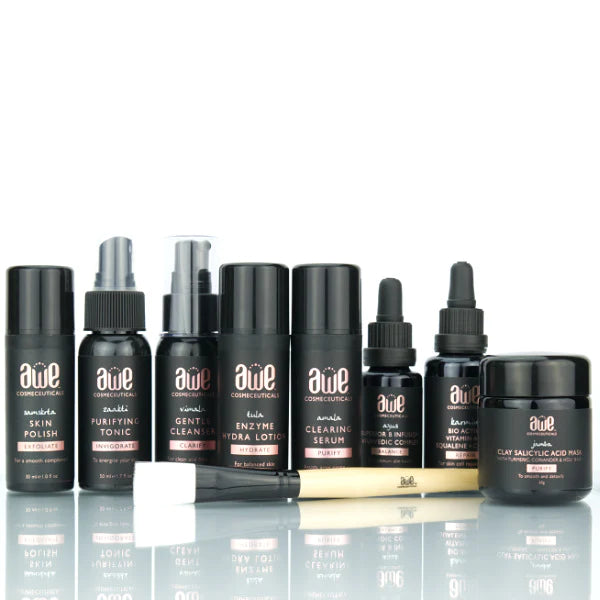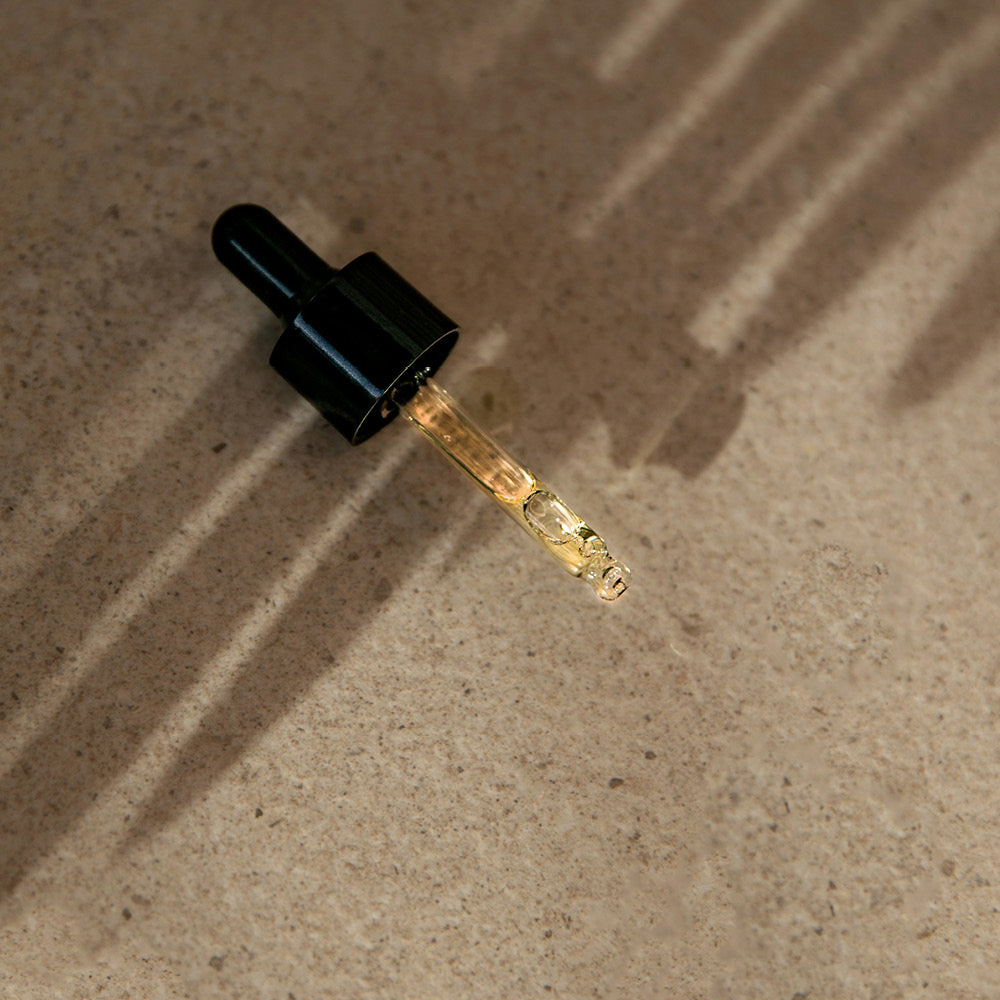This store requires javascript to be enabled for some features to work correctly.
Our (long list) of ingredients
One of the things we are most passionate about here at AWE Cosmeceuticals™ is finding and sourcing the very best active ingredients to use in our products. Our selection process is very thorough and always starts with the science, both the ancient science of Ayurveda and the latest western skin science. We formulate our products with very high levels of active ingredients to ensure maximum efficacy and demonstrable results.
Our own proprietary blend of Ayurvedic ingredients to provide antioxidant support, anti-ageing and anti-inflammatory benefits.
Known in Ayurveda as ‘Amalaki’, it is considered the ultimate herb for rejuvenation and the reversal of the ageing process. It is a powerful anti-oxidant and contains the highest natural source of vitamin C. The vitamin C content in Amalaki provides 45-70% of the antioxidant ability.
Aloe vera has been valued as a healing plant for thousands of years. It is most widely known for its ability to promote wound healing. There are numerous studies on the wonderful benefits of this plant including anti-inflammatory effects when used topically. Aloe vera is also naturally anti-bacterial and anti-fungal.
Another leading adaptogenic herb in Ayurveda. Ashwagandha protects the skin from free radicals damage and is excellent as an anti ageing support. Taken internally it provides strength and immunity and improves our ability to handle stress.
Coconut water for cell rejuvenation and hydration. Young, green coconuts hold the greatest amount of coconut water, serving as a natural reservoir. promoting tissue growth in the development of the coconut flesh. This coveted liquid is extracted, then freeze dried to ensure that the solids retain optimum biological activity for the skin.
Ginger is widely known as having an extensive range of benefits and is used extensively in Ayurvedic and Chinese medicines. In skin care treatments it is non-irritating and improves circulation.
Gingko biloba is widely used in Asian medicine for its diverse properties which include improvement in circulation, neutralising free radicals and protection of cell membranes.
Widely used in traditional medicine for wound healing. Recent studies show it has potent antioxidant benefits and increases blood supply, inhibits bacterial growth and promotes collagen production.
Green tea’s medicinal properties are attributed to polyphenols, those found in greet teas are called catechins. Green tea quenches free radicals and has shown protection from UV damage. Preliminary studies also show that green tea may inhibit metalloproteinases (MMP).
A natural humectant honey helps to hydrate the skin by attracting water to it. Honey has a number of wonderful properties including anti-bacterial, soothing, promotion of wound healing and antioxidant qualities.
Basil is used extensively in Ayurvedic medicine. The oil harvested from the plant is beneficial for acne prone areas and is refreshing on damaged skin.
It is used to treat a variety of conditions in Ayurvedic medicine; however it is most widely known for its well documented anti-inflammatory effect. Also effective in helping to reconstruct collagen in the skin, and therefore a perfect partner in anti-ageing products.
A leading anti-inflammatory ingredient in Ayurvedic medicine. It has similar effects to steroids like cortisone. It is also useful in treating pigmentation and can help balance oil secretions.
Derived from black pepper, Cosmoperine aids as a penetration booster for actives within a formulation, enabling these actives to be delivered exactly where needed.
Tetrahydrocurcumoids (THC), is the biologically active compound found in turmeric. THCs have been reported to have profound antioxidant benefits, capability of reducing acute inflammation, whilst also having excellent wound healing capabilities.
Sandalwood (Santalum album), has a rich history in Indian culture and is used extensively for its exotic scented heartwood and oil. In Ayurveda Sandalwood, also known as chandana in Sanskrit, is used externally as a paste for skin disorders, fever, rashes, excessive sweating, acne, ulcers and numerous other disorders. Due to its cooling, astringent and sweet properties it is very good for relieving excess pitta. It has antibacterial and anti inflammatory properties and is soothing to troubled skin.
A pure form of vitamin A encapsulated in a cyclsystem complex (see Cyclodextrin), to ensure effective delivery and reduce irritation. Retinol is converted into retinoic acid by metabolic processes in the skin. Our skin has specific receptors which identify retinol and convert it into a usable form.
Not all retinol will be converted into retinoic acid, and in the case of retinyl palmitate, even less is converted. For this reason excessively high amounts of retinol are not only wasted but also known to cause harmful skin irritation. This in turn creates an inflammatory response, resulting in the unwanted formation of free radicals.
Niacinamide has become a very popular skin care ingredient most notably in whitening, anti-ageing and anti-acne products. It is proven to aid the repair of DNA by increasing cell energy.
A stable form of Vitamin C, it is an effective antioxidant, skin lightening agent and stimulates collagen formation for improved skin appearance.
We use a number of Vitamin C derivatives that have antioxidants, stimulate collagen production, help minimise pigmentation and brighten skin tone. Vitamin C derivatives are stable and do not have the irritation potential of L-Ascorbic Acid. Our Vitamin C derivates include 3-Glyceryl Ascorbate, 3-O-Ethyl Ascorbic Acid and Ascorbyl Tetraisopalmitate
Alpha tocopherol is the main component of vitamin E (D tocopherol). It is an excellent anti-oxidant, however tocotrienols (alpha, beta, gamma and delta) have far superior anti-oxidant qualities. Mixed tocopherols are the combination of D tocopherol and the four tocotrienols.
An essential amino acid, arginine functions as an antioxidant, aids in collagen production and aids in wound healing.
A naturally occurring amino acid which protects the skin from glycation and oxidation, both of which contribute the cross linking of proteins. Ageing and sun exposure increases cross linking of collagen fibres, which produces visible skin ageing in the form of wrinkling and loss of skin tone. Carnosine has proven to help rejuvenate ageing skin cells.
A proline, lysine, and copper complex, Neodermyl helps in the production of collagen. This is true especially in ageing cells, by providing essential amino acids, copper to reactivate the enzyme responsible for maturation of collagen and elastin fibres. Resulting in reduced wrinkle depth and energy for ageing skin cells.
Retinoic acid is essential to skin health. The benefits of topical application in skin care have been studied with excellent results, especially in ageing skins. Our skin has specific receptors which identify retinol and convert it into a usable form. Retinoic acid helps to refine the texture of skin, improve function, reduce signs of ageing and is effective in the treatment of acne.
Innovative hexapeptide, shown to directly simulate the natural protein functions of the skin, promoting its ability to repair and even delete DNA damage. The perfect anti-ageing, anti-wrinkle partner, this active aids in maintaining a younger looking complexion for longer.
With all of the wrinkle-smoothing effects of the Matrixyl® Peptide without harsh irritants such as butylene glycol, this powerful peptide boosts 6 skin-rebuilding constituents including collagen, laminin and fibronectin to smooth lines and wrinkles, lift, and plump the complexion.
AWEs own proprietary blend of anti-ageing peptides. Focused of addressing ageing at a cellular level, with natural penetration enhancers.
In Ayurveda black pepper has numerous uses and is crowned, ‘the king of spices’. It is pacifying to kapha dosha due to its warming, antimicrobial and aromatic properties. It is excellent for respiratory issues and detoxification.
The oil of cardamom seeds is warming and has excellent antiseptic and antibacterial properties. It boosts the metabolism and is also useful for relieving muscle cramps and spasms.
Used both as a stimulant and aromatic in Ayurveda. Clove oil is warming and excellent for vata and kapha. It is good for infections, oral health and for relieving respiratory conditions such as coughs and colds.
This oil is extracted from a herb which comes from the lavender and mint family. It has an anti-inflammatory action, the topical application of Coleus Forskohlii Oil is beneficial for treating skin conditions with inflammatory components such as eczema and psoriasis. Laboratory studies found it inhibits the growth of these skin pathogens:
- Propionibacterium acnes which is a micro-organism present in acne and skin infections;
- Staphylococcus aureus which is a bacterial strain found in acne eruptions;
- Staphylococcus epidermis which is a bacterial strain found in acne and other bacterial infections of the skin
High in omega 6. This oil is good for all skin types, it has a light satin finish. Due to its mildly astringent properties it is good for acne prone skin.
This oil contains a high quantity of polyunsaturated fatty acids, antioxidants, phospholipids, vitamins and minerals. It is a highly emollient oil which is non- greasy and leaves a satin sheen on the skin. Hemp seed oil is moisture balancing and is highly effective for dry skin, psoriasis, eczema and minor skin lesions.
Used, a fragrance, Jasminum sambac is considered to have rejuvenating, boosting and energizing properties. Naturally a rich, dark orange-red colour, this can be seen in the formulations in which it is used. It is especially suited to pitta dosha.
Jojoba oil is antioxidant and anti-inflammatory and it is non-comedogenic and is effective in breaking down sebum. Suitable for use on skin and hair.
Lavender is a widely used essential oil, known for its anti-inflammatory properties and pleasant scent. It is suitable for all skin types.
Pomegranate seed oil is anti-inflammatory, antioxidant and stimulates keratinocytes, which contributes to its anti-ageing and wrinkle fighting abilities. It has a small molecular size, enabling it to penetrate easily into the skin and thereby improve moisture and maintain the skin’s vitality and elasticity. Pomegranate seed Oil is a rich source of punicic acid, an Omega 5 fatty acid and ellagic acids. Both aid in protection against sun damage and prevention of wrinkles.This oil is also beneficial for clients suffering with eczema and psoriasis due to its anti-inflammatory benefits.
Raspberry seed oil contains Omega 3 and Omega 6 fatty acids, Vitamin A and E gamma, alpha and delta tocopherols and tocotrienols. This oil is effective for soothing skin irritations, such as eczema and minor skin lesions. Raspberry seed oil has an estimated SPF value of between 28 and 50! This does not however substitute for a sunscreen.
Rose oil is pacifying to all Ayurvedic doshas and is cooling however still helps boost agni (digestive fire). It is calming for the skin and especially good for pitta and vata doshas. Subtle, low irritant, natural fragrance.
Sandalwood (Santalum album), has a rich history in Indian culture and is used extensively for its exotic scented heartwood and oil. In Ayurveda Sandalwood, also known as chandana in Sanskrit, is used externally as a paste for skin disorders, fever, rashes, excessive sweating, acne, ulcers and numerous other disorders. Due to its cooling, astringent and sweet properties it is very good for relieving excess pitta. It has antibacterial and anti inflammatory properties and is soothing to troubled skin.
A pale yellow oil, rich in linoleum acid. It is useful for all skin types due to it being highly moisturising and soothing. An effective natural alternative to mineral oils and synthetic emollients.
Rich in antioxidant phytosterols, it is moisturising and skin conditioning.
Allantoin can be extracted from a number of botanical extracts such as wheatgerm, acting as soothing and anti-irritant active. It is also commonly used in anti-ageing formulations to help encourage healthy tissue formation.
Beta Glucan interacts directly with the body’s immune system by activating Langerhan cells. These cells are attack any bacteria or viruses and also provide a way to repair the skin cells due to damage. It is very beneficial for wound healing and also for mild sunburn and itchy skin conditions.
Widely known for its anti-inflammatory, anti-irritant and anti-microbial properties Bisabolol is the principle constituent of German Chamomile.
A vitamin-like substance synthesized by the body. It is vital in cellular energy and acts as an antioxidant. As we age the amount of Co-enzyme Q10 decreases within cells.
Derived from the sap of the Croton lechleri tree, it is very high in polyphenols which provide strong antioxidant effect. It was traditionally sued for wound healing and numerous other conditions.It also helps to protect and strengthen collagen fibres in the skin.
Naturally occurring in cells, gluconic acid is a Polyhydroxy acid PHA, which has proven benefits in skincare. It acts as a humectant and is also beneficial for evening skin tone. Naturally found in fruits & honey, this active is water soluble and non-toxic meaning that it is completely metabolized in the body. It slowly hydrolyses to gluconic acid, producing a gentle acidification in the same way as lactic acid- producing bacteria.
Naturally found in epithelial (surface), connective and neural tissues of the body. Hyaluronic acid is a glycosaminoglycan and important in cell renewal. It is a humectant, which means it attracts water, hence its use in skin care formulations and in injectable fillers such as Restylane®
Papaya extract fermented with lactobacillus makes this a probiotic ingredient. Probiotics help in maintaining good bacteria in balance and helping eliminate bad bacteria. Papaya and fruit enzymes are very beneficial for removing dead skin cells and promoting wound healing.
A naturally occurring molecule found in the skin of red wine grapes, it is also present in some berries and parts of the peanut plant. It has proven to have exceptionally high antioxidant benefits, which exceed those of vitamins A, C and E.
Myristyl Phospohomalate, a phosphorylated complex lipid, in an oil soluble excipient. Revidrate acts by promoting the skin’s own natural moisturising components.
A beta hydroxy acid, BHA. It aids in cellular turnover & prevents clogged pores.
A natural substance found in our skin, our squalene is derived from sustainable sugar cane. It provides antioxidant benefits as well as skin conditioning and moisturising properties.
The bark from this willow tree contains salicin; salicylic acid and aspirin are derived from salicin. It has been used in medicine for aches, pains and fever. In skincare it provides anti-inflammatory and antioxidant benefits. It is also ideal for calming irritated and itchy skin
